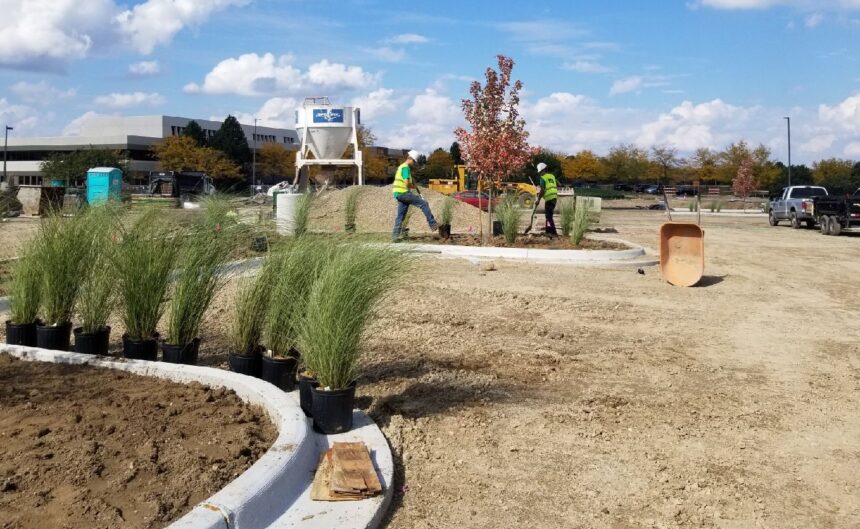In today’s competitive business environment, maintaining an attractive and functional outdoor space is no longer optional. It is a critical aspect of property management that directly impacts a company’s brand image and the customer experience. A key component of achieving this is a robust irrigation system. Professional irrigation installation lays the foundation for resilient commercial landscapes, ensuring that businesses can maintain vibrant, healthy, and sustainable outdoor environments.
This article explores the importance of professional irrigation installation and how it supports the long-term success of commercial properties.
Why Irrigation Systems Matter for Commercial Properties
The role of an irrigation system extends far beyond watering plants. It encompasses:
- Preserving Plant Health: A well-designed irrigation system ensures consistent hydration, preventing issues like root rot from overwatering or wilting due to drought.
- Saving Resources: Efficient systems conserve water by delivering it where it’s needed most, reducing waste.
- Boosting Property Value: Beautifully maintained landscapes enhance curb appeal and elevate the overall value of commercial properties.
- Enhancing Customer Perception: A lush, green environment creates a welcoming atmosphere that resonates positively with visitors, clients, and employees.
Given these benefits, the installation of an irrigation system is an investment in both aesthetics and functionality for any commercial property.
The Advantages of Professional Installation
While it may be tempting to undertake irrigation installation as a DIY project, professional services offer distinct advantages:
1. Customized Design
Professional installers evaluate the specific needs of a property, considering factors such as soil type, plant species, sun exposure, and slope. This tailored approach ensures that every zone receives optimal water coverage.
2. Precision and Efficiency
Expert installation minimizes errors, such as uneven water distribution or poorly aligned sprinkler heads, which can lead to wastage and ineffective irrigation. Precision installation enhances system performance and longevity.
3. Advanced Technology Integration
Modern irrigation systems often incorporate advanced features like smart controllers, moisture sensors, and drip irrigation. Professionals are well-versed in these technologies and can integrate them seamlessly into the system.
4. Compliance with Regulations
Irrigation systems must adhere to local water use regulations and environmental standards. Professional installers ensure compliance, avoiding potential fines or legal complications.
5. Cost Savings Over Time
Though the initial cost of professional installation may be higher, the long-term savings in water bills, maintenance, and repair costs make it a cost-effective choice.
Key Components of a Well-Designed Irrigation System
A successful irrigation system relies on the careful selection and installation of its components. These include:
1. Sprinkler Heads
Different types of sprinkler heads cater to varying needs:
- Rotary Sprinklers: Ideal for large, open areas, providing even coverage with minimal water loss.
- Fixed Spray Heads: Best for smaller zones and intricate layouts.
- Drip Emitters: Deliver water directly to the roots, reducing evaporation and runoff.
2. Controllers
Controllers act as the brain of the irrigation system. Smart controllers, in particular, adjust watering schedules based on weather conditions, soil moisture levels, and seasonal changes, ensuring optimal water use.
3. Valves
Valves regulate water flow to different zones, ensuring that each area of the landscape receives the appropriate amount of hydration.
4. Pipes and Fittings
Durable pipes and fittings ensure a leak-free and efficient system. High-quality materials reduce the likelihood of wear and tear over time.
5. Rain Sensors
Rain sensors prevent irrigation during rainfall, conserving water and avoiding oversaturation of the soil.
The Role of Sustainability in Irrigation Systems
Sustainability is a growing priority in landscaping. Businesses are increasingly adopting eco-friendly practices, and irrigation systems play a crucial role in this transition.
Efficient Water Use
Modern irrigation systems, such as drip irrigation and smart controllers, deliver water precisely where and when it’s needed. This targeted approach minimizes water waste and promotes conservation.
Supporting Native Plants
Native plants require less water and are more resilient to local conditions. Pairing a sustainable irrigation system with native landscaping creates a low-maintenance, eco-friendly environment.
Reducing Environmental Impact
By preventing runoff and soil erosion, well-designed irrigation systems protect nearby ecosystems and waterways from contamination by fertilizers or pesticides.
Innovation Landscaping prioritizes sustainability in its irrigation installation projects, helping clients create resilient landscapes that align with environmental goals.
Steps in Professional Irrigation Installation
Professional irrigation installation involves a systematic approach to ensure a durable and efficient system:
1. Site Assessment
The process begins with a thorough evaluation of the property. Professionals assess factors such as soil type, topography, plant requirements, and water pressure to design a system that meets the site’s unique needs.
2. System Design
Based on the assessment, a customized irrigation plan is developed. This includes determining the layout, selecting components, and planning zones for efficient water distribution.
3. Installation
Trenches are dug, pipes and fittings are laid, and components such as sprinkler heads and controllers are installed. Professionals use precise techniques to ensure proper alignment and minimize disruptions to the landscape.
4. System Testing
Before finalizing the installation, the system undergoes rigorous testing to identify and address any leaks, misalignments, or programming errors.
5. Training and Maintenance Guidance
Once the system is operational, professionals provide training on its use and maintenance, empowering property managers to operate it effectively.
The Long-Term Benefits of a Professionally Installed System
The advantages of professional irrigation installation extend well beyond the initial setup:
1. Consistent Plant Health
Proper hydration ensures that plants remain vibrant and healthy year-round, enhancing the aesthetic appeal of the property.
2. Cost Savings
Efficient water use reduces utility bills, while durable components lower maintenance and repair expenses.
3. Enhanced Reputation
A well-maintained landscape reflects positively on a business, demonstrating professionalism and attention to detail.
4. Environmental Stewardship
Eco-friendly irrigation practices position businesses as responsible stewards of the environment, appealing to environmentally conscious customers and stakeholders.
Choosing the Right Partner for Irrigation Installation
Selecting a trusted partner for irrigation installation is essential to achieving these benefits. Innovation Landscaping combines expertise, creativity, and sustainability to deliver customized solutions for commercial properties. Their commitment to quality ensures that every system they install meets the highest standards of efficiency and reliability.
Conclusion
Professional irrigation installation is a cornerstone of successful commercial landscaping. By ensuring precise water distribution, reducing waste, and supporting sustainable practices, it creates resilient landscapes that benefit businesses, customers, and the environment.
For businesses seeking to enhance their outdoor spaces, partnering with a reliable provider like Innovation Landscaping ensures the creation of irrigation systems that stand the test of time. Investing in professional installation is not just a choice; it’s a commitment to quality, sustainability, and long-term success.


